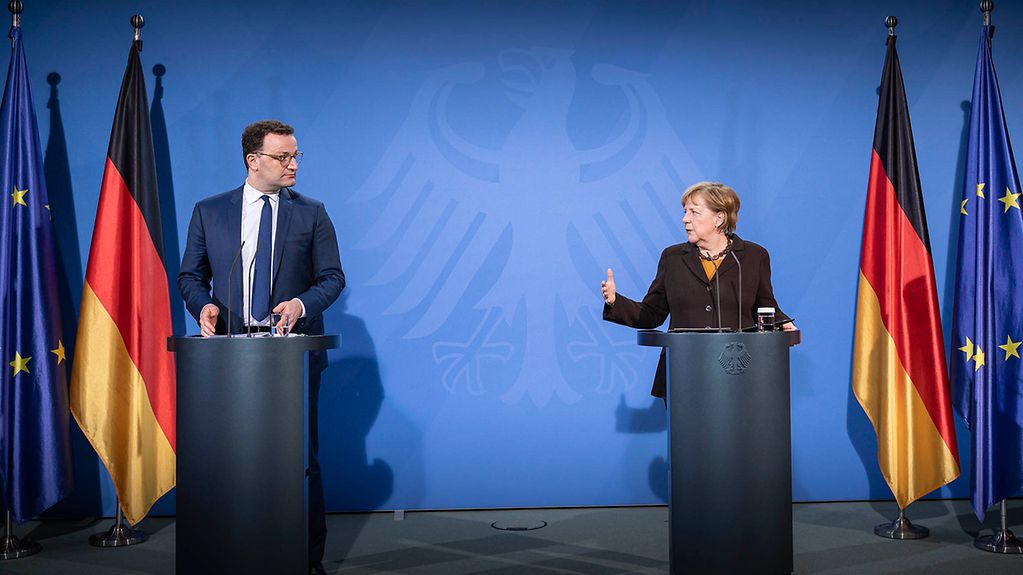Decision of Ministers of Health
The AstraZeneca vaccine is to be used primarily for older age groups. The vaccine can, however, be used in younger patients at the discretion of the physician administering the vaccine and after weighing up the risks on a case by case basis. “We need to be able to trust the vaccines,” said the Chancellor.
3 min reading time

Chancellor Angela Merkel and Federal Minister of Health Jens Spahn at the press conference
Photo: Bergmann/Bundesregierung
As of Wednesday 31 March, AstraZeneca’s COVID-19 vaccine is to be used primarily for people over the age of 60. This has now been decided by the Federal and Länder Ministers of Health and Senators for Health.
Earlier, the German Standing Committee on Vaccination (STIKO) had published a revised draft of their recommendations for COVID-19 vaccinations. In it, the Committee recommends using the AstraZeneca vaccine for people over the age of 60. It may, however, still be used in younger people, reads the decision “at the discretion of the physician and having weighed up the individual risks on a case by case basis, and if the vaccinee so decides after being fully informed”.
“Every suspicion will be followed up”
The recommendations published by STIKO are based on findings compiled by experts in recent weeks regarding very rare but very serious cases of clots in the vessels draining blood from the brain (CVST) in individuals who had been inoculated with the AstraZeneca vaccine. “These are findings that the Standing Committee on Vaccination cannot ignore and that we thus cannot ignore,” said the Chancellor.
Vaccinations are still the most important weapon in efforts to combat COVID-19, and citizens must be able to trust the vaccines. “Trust comes from the knowledge that every suspicion and every individual case will be followed up,” said the Chancellor. “The Federal and Länder Governments guarantee that.”
60- to 69-year-olds will be vaccinated more rapidly
Federal Minister of Health Jens Spahn stressed, “Citizens in Germany can be sure that vaccines approved for use in Germany are minutely monitored – and that the results of this monitoring will be made transparent.”
The Ministers of Health and Senators for Health of the Länder have agreed the following with the Federal Minister of Health:
- As of Wednesday, the AstraZeneca vaccine will be used for people aged 60 or over. The Länder are authorised to involve this age group in their vaccination campaigns with this specific vaccine. This provides an opportunity to vaccinate this highly vulnerable and numerically large age group more swiftly in the face of the worsening third wave.
- The AstraZeneca vaccine will be used for people in priority groups 1 and 2 (the top two priority groups), who have not yet reached the age of 60, where the vaccinating physician and the vaccinee decide to do so at the discretion of the physician and after weighing up the individual risks on a case by case basis, and after the vaccinee has been fully informed. This is to take place in the medical practices of the individual local physicians.
The decision now means that over 60-year-olds can be vaccinated more rapidly, stressed Jens Spahn. “I can only ask all over 60-year-olds to take up this offer of a vaccination. “The AstraZeneca vaccine is extremely effective – especially in the older age groups.
Recommendation regarding second shots to be published by the end of April
People under the age of 60 who have already received the first AstraZeneca vaccination may decide whether to take the second AstraZeneca shot or whether they would prefer to wait for the moment, said the Conference of Ministers of Health. The Standing Committee on Vaccination (STIKO) is to publish additional recommendations on this by the end of April.